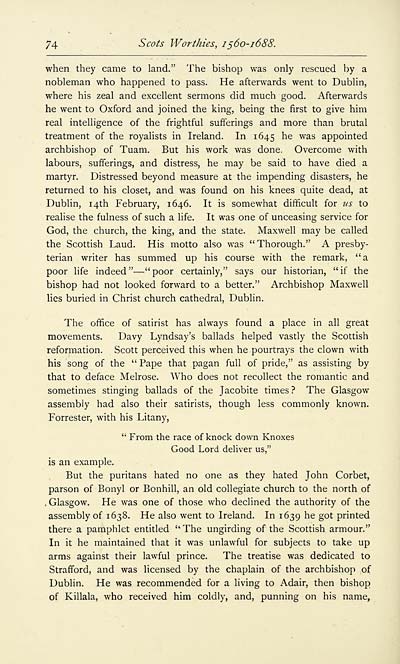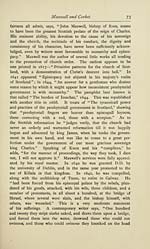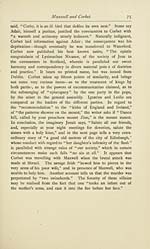Scots worthies, 1560-1688
(94) Page 74
Download files
Complete book:
Individual page:
Thumbnail gallery: Grid view | List view

74 Scots Worthies, 1 560-1688.
when they came to land." The bishop was only rescued by a
nobleman who happened to pass. He afterwards went to Dublin,
where his zeal and excellent sermons did much good. Afterwards
he went to Oxford and joined the king, being the first to give him
real intelligence of the frightful sufferings and more than brutal
treatment of the royalists in Ireland. In 1645 ne was appointed
archbishop of Tuam. But his work was done. Overcome with
labours, sufferings, and distress, he may be said to have died a
martyr. Distressed beyond measure at the impending disasters, he
returned to his closet, and was found on his knees quite dead, at
Dublin, 14th February, 1646. It is somewhat difficult for us to
realise the fulness of such a life. It was one of unceasing service for
God, the church, the king, and the state. Maxwell may be called
the Scottish Laud. His motto also was "Thorough." A presby-
terian writer has summed up his course with the remark, "a
poor life indeed" — "poor certainly," says our historian, "if the
bishop had not looked forward to a better." Archbishop Maxwell
lies buried in Christ church cathedral, Dublin.
The office of satirist has always found a place in all great
movements. Davy Lyndsay's ballads helped vastly the Scottish
reformation. Scott perceived this when he pourtrays the clown with
his song of the " Pape that pagan full of pride," as assisting by
that to deface Melrose. Who does not recollect the romantic and
sometimes stinging ballads of the Jacobite times ? The Glasgow
assembly had also their satirists, though less commonly known.
Forrester, with his Litany,
" From the race of knock down Knoxes
Good Lord deliver us,"
is an example.
But the puritans hated no one as they hated John Corbet,
parson of Bonyl or Bonhill, an old collegiate church to the north of
. Glasgow. He was one of those who declined the authority of the
assembly of 1638. He also went to Ireland. In 1639 he got printed
there a pamphlet entitled " The ungirding of the Scottish armour."
In it he maintained that it was unlawful for subjects to take up
arms against their lawful prince. The treatise was dedicated to
Strafford, and was licensed by the chaplain of the archbishop of
Dublin. He was recommended for a living to Adair, then bishop
of Killala, who received him coldly, and, punning on his name,
when they came to land." The bishop was only rescued by a
nobleman who happened to pass. He afterwards went to Dublin,
where his zeal and excellent sermons did much good. Afterwards
he went to Oxford and joined the king, being the first to give him
real intelligence of the frightful sufferings and more than brutal
treatment of the royalists in Ireland. In 1645 ne was appointed
archbishop of Tuam. But his work was done. Overcome with
labours, sufferings, and distress, he may be said to have died a
martyr. Distressed beyond measure at the impending disasters, he
returned to his closet, and was found on his knees quite dead, at
Dublin, 14th February, 1646. It is somewhat difficult for us to
realise the fulness of such a life. It was one of unceasing service for
God, the church, the king, and the state. Maxwell may be called
the Scottish Laud. His motto also was "Thorough." A presby-
terian writer has summed up his course with the remark, "a
poor life indeed" — "poor certainly," says our historian, "if the
bishop had not looked forward to a better." Archbishop Maxwell
lies buried in Christ church cathedral, Dublin.
The office of satirist has always found a place in all great
movements. Davy Lyndsay's ballads helped vastly the Scottish
reformation. Scott perceived this when he pourtrays the clown with
his song of the " Pape that pagan full of pride," as assisting by
that to deface Melrose. Who does not recollect the romantic and
sometimes stinging ballads of the Jacobite times ? The Glasgow
assembly had also their satirists, though less commonly known.
Forrester, with his Litany,
" From the race of knock down Knoxes
Good Lord deliver us,"
is an example.
But the puritans hated no one as they hated John Corbet,
parson of Bonyl or Bonhill, an old collegiate church to the north of
. Glasgow. He was one of those who declined the authority of the
assembly of 1638. He also went to Ireland. In 1639 he got printed
there a pamphlet entitled " The ungirding of the Scottish armour."
In it he maintained that it was unlawful for subjects to take up
arms against their lawful prince. The treatise was dedicated to
Strafford, and was licensed by the chaplain of the archbishop of
Dublin. He was recommended for a living to Adair, then bishop
of Killala, who received him coldly, and, punning on his name,
Set display mode to:
![]() Universal Viewer |
Universal Viewer | ![]() Mirador |
Large image | Transcription
Mirador |
Large image | Transcription
Images and transcriptions on this page, including medium image downloads, may be used under the Creative Commons Attribution 4.0 International Licence unless otherwise stated. ![]()
| Histories of Scottish families > Scots worthies, 1560-1688 > (94) Page 74 |
|---|
| Permanent URL | https://digital.nls.uk/95152154 |
|---|
| Description | A selection of almost 400 printed items relating to the history of Scottish families, mostly dating from the 19th and early 20th centuries. Includes memoirs, genealogies and clan histories, with a few produced by emigrant families. The earliest family history goes back to AD 916. |
|---|

